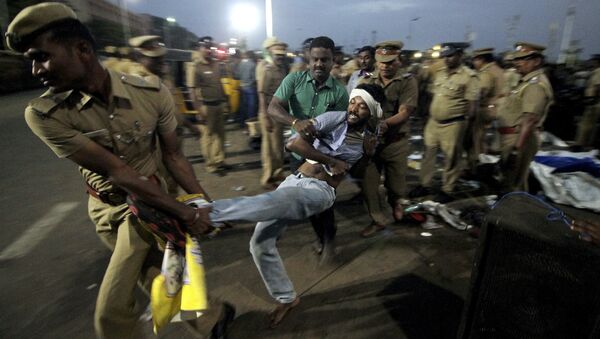#jallikattuordinance #JallikattuForever #கோவை வ.உ.சி மைதானத்தில் திரண்ட பல்லாயிரக்கணக்கான திரண்ட மக்கள் https://t.co/gJqyXviDEU pic.twitter.com/nt7ywnNLgk
— Dinakaran (@dinakaran_web) January 22, 2017
The protesters barraged police with stones, who responded with tear gas grenades. Protesters also set several dozen vehicles ablaze. The protests have lasted all week and severely slowed industry in Chennai, the capital of Tamil Nadu and the epicenter of the protests.
#Superstar #Rajinikanth's humble request to all #Jallikattu protestors
— ChennaiOnline (@ChennaiOnline) January 23, 2017
#JallikattuForever #Police Marinahttps://t.co/qdZQzKVuQp pic.twitter.com/j452gBb7Ic
Over 100 protesters have been arrested, and 22 police officers were reportedly injured. However, Tamil Nadu police announced that the protests were generally "orderly" and "disciplined." The sustained protest appears to have worked, as senior police officer P.K. Kannan announced that "Jallikattu will be celebrated. We urge the protesters to go back home immediately," in an official statement. Police have begun evicting protesters who refuse to quit, as "their purpose has been fully achieved."
#Jallikattu matter is #SubJudice: PM tells #TamilNadu CMhttps://t.co/XVCGpCXS0T #JallikattuOrdinance #Jallikattuprotest #SaveJallikattu pic.twitter.com/rIXu6P8l7n
— DT Next (@dt_next) January 19, 2017
The protest movement was supported by numerous Tamil celebrities, as well as prime minister Narendra Modi. As the ban came from India's Supreme Court, some have called the outrage a proxy conflict between the Tamil people and the central government.
#Alanganallur #Jallikattu Called Off As Protesters Want A Permanent Fix (A Law/ Not #JallikattuOrdinance) To Solve The Issue. #Dindigul pic.twitter.com/NelUoQSjAr
— Sir Ravindra Jadeja (@SirJadeja) January 22, 2017
The protests caused a significant slowdown in Chennai's economy. Ford India announced that a factory was closed for several hours due to employee safety concerns, and Indian automobile manufacturer Ashok Leyland also closed on Monday.
Take #Ordinance route, says #Captain https://t.co/pk1xsuYatK #Vijayakanth #MDMK #JallikattuOrdinance #SaveJallikattu #TamilNadu pic.twitter.com/ZtrsNMe1uc
— DT Next (@dt_next) January 10, 2017
Unlike the more well-known Spanish variant of bullfighting, Jallikattu does not involve the use of lances or swords and bulls are rarely killed. Instead, a team of men attempt to hold onto the bull for a certain period of time and sometimes grab flags that are attached to its horns. The sport, which dates to 500 BC, is wildly popular in Tamil Nadu during the mid-January Mattu Pongal celebrations.
How Many #Jallikattu Supporters On Twitter?? RT MAX #justiceforjallikatu #jallikattuordinance #Jallikattuprotest #SaveJallikattu pic.twitter.com/sU34oINxpU
— Vijay Sethupathi (@ActorSethupathy) January 21, 2017
While striking the bull is prohibited, animal rights groups point out that the bull suffers injury from participants biting or twisting the animal's tail. To control the bulls before and after fights, the animals are reportedly prodded with sharp objects such as scythes and knives.
If President approves #JallikattuOrdinance tomo and Governor issues Gazette notifcn day after, #Jallikattu can happen as early as Jan 26th! pic.twitter.com/a9pzjPVIr6
— Ramesh Bala (@rameshlaus) January 20, 2017
Groups such as the Animal Welfare Board of India, the Federation of Indian Animal Protection Organisations, and PETA India have all protested the practice. PETA also claims the events are dangerous for spectators and participants, causing 1,200 injuries between 2010-2014.
BREAKING: #JallikattuOrdinance passed and #Jallikattu will happen tomorrow at #Alanganallur pic.twitter.com/wigeUmPIQt
— Behindwoods (@behindwoods) January 21, 2017
Several attempts have been made to regulate or ban Jallikattu in recent years. The Supreme Court of India outlawed Jallikattu in May 2014, but the ban has been repeatedly flouted by government and private organizations.
A person look alike Gandhi protests for #Jallikattu in Marina beach! #justiceforjallikatu #Jallikattuprotest #AmendPCA pic.twitter.com/ZNIsk1MlcR
— Kollywood-V2Cinemas (@V2Cinemas) January 20, 2017
In January 2017 the Supreme Court ordered the government of Tamil Nadu to arrest anyone who participated in a Jallikattu event, sparking the protests.
'This is Tamil pride': At Chennai beach, NRIs fund #jallikattu protesters https://t.co/9w7SlfekSh#Jallikattuprotest pic.twitter.com/GB4n7pC5GR
— NDTV (@ndtv) January 19, 2017
The first Jallikattu events after the ban was lifted have reportedly led to as many as 90 injuries and two human deaths.


